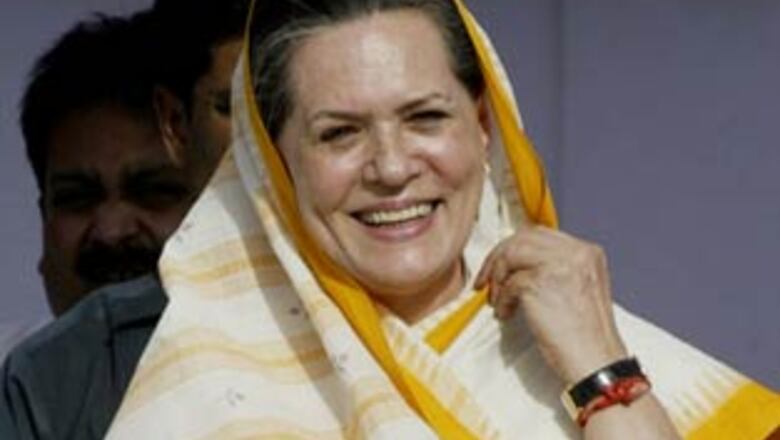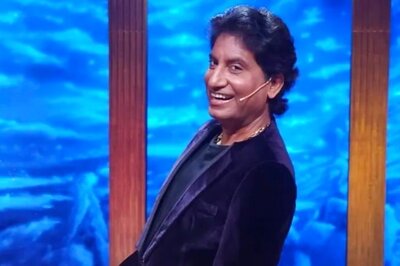
views
Name: Sonia Gandhi
Born: December 9, 1946 at Lusiana, Italy
Married: Rajiv Gandhi in 1968
Lost: Mother-in-law Indira Gandhi and husband Rajiv Gandhi to assassinations
Gained: The post of president of a rudder-less Congress
Achieved: Return of the party to power after a full term, a feat last seen in 1984.
Adopted: A refreshing style of politics that avoids personal attacks, jingoism and divisive talk
Should a politician rate higher on the Forbes list at the start of her party’s second term in office than she did near the end of its first? Well, if you go by the usual pattern of political careers, then probably not.
Experience shows us that politicians — especially in India — are usually swept in on a wave of expectations. Invariably, they fail to deliver on these expectations. They fall out with their colleagues. The press turns against them. And at the very next election, the voters turn them out.
Nothing like that has happened to Sonia Gandhi. Her career is living proof that sometimes history is no guide when it comes to predicting the trajectory of political careers.
For a start, Sonia Gandhi was never swept into power on the back of a wave. Few people expected the Congress to win the 2004 election. When it did emerge as the leading party in a hung Parliament, the general reaction throughout the country was less one of jubilation and more one of consternation.
So, there were no expectations. The editorial writers all declared that it was not that the Congress had won the election, more that the BJP had lost.
More important: Nobody really understood Sonia Gandhi. Nobody knew what she believed in. And nobody knew what a Congress government would be like.
That she should be perceived as being so powerful today demonstrates that behind the enigma was a woman with strong views and a deep understanding of what needed to be done to safeguard the interests of those whom she saw as her primary concern: The poor, the disadvantaged and those at the margins of Indian society.
When she was elected, few people guessed that these were her real concerns. Instead, they made the mistake of thinking of her as just another dynastic politician with few real core beliefs.
Reluctant Politician
You cannot really understand Sonia Gandhi unless you understand why she joined politics. It is no secret that she was bitterly opposed to her husband Rajiv’s entry into the political arena.
Her basic fear was that her husband would be killed, just as his mother had been. Eleven years ago, in the first TV interview she ever did, I told her how we saw her in the days of Rajiv’s prime-ministership. She always seemed tense, distant and unsmiling.
“You saw me when we were in public,” she explained. “And every moment when we were in public, I thought Rajiv would be killed.”
When what she feared most did happen, she made a conscious effort to move away from politics. She wrote and compiled two books on Rajiv and intended to write books about her real interests (she was very keen to do a book on trees of India, for instance) when a steady stream of visitors and old colleagues of her husband told her that the Congress, under Sitaram Kesri, was on the verge of annihilation.
PAGE_BREAK
In that same interview, she had offered the explanation for her entry into politics that would widely be quoted in the years to come: “I could not walk past the portraits of my husband, my mother-in-law and her father and not feel that I had some responsibility to try and save the party they had given their lives to.”
It sounds almost a little too pat now but even then I had no doubt that she meant it. Most assessments of Sonia Gandhi ignore how close she was to Indira Gandhi and how she still worships — there is no other word for it — her late husband. She could not bear that their deaths had been in vain. She felt that, in whatever way she could, she had some obligation to try and save the Congress.
Despite the doubters, the sceptics and the hecklers, she has never diverted from that aim. Contrary to what people say, she never ever wanted to be Prime Minister. When the Vajpayee government fell in the no-confidence motion and it seemed probable that the Congress would form the next government, she told the President to swear in Manmohan Singh.
And five years ago, when poll results began to suggest that a Congress-led coalition was a possibility, she told friends that it would be Manmohan again. At the time, the BJP was still going on and on about the videshi bahu factor, so many friends (and apparently her children) asked her why she did not simply declare that she did not want to be PM. Her explanation was that she could not reveal this till a ruling coalition was in place because Congressmen and allies alike, would stake their claims to the top job brushing aside Manmohan Singh’s weak political credentials.
Another view is that she wanted to prove that even if the BJP did not regard her as truly Indian, the people of this country certainly did. Once this had been established beyond all doubt, she made her true intentions clear.
Super PM?
Of all the mysteries surrounding Sonia Gandhi in recent years, none is more enduring than this: What does she actually do?
In other words: What is her role in the government? How much of what Manmohan Singh does is guided by her? Does she really call the political shots?
The answers are actually quite simple. She has no daily input into how the government is run. She has no idea when the Cabinet will meet. She does not know what the agenda is. And she reads about its decisions in the papers just as you and I do. This may sound bizarre. But it is true.
Nor does she have any great hold on the bureaucracy. It has often been suggested that senior civil servants report to her. In fact, she has virtually no dealings with them. Nor does she have her own people in key positions. For instance, repeated newspaper suggestions to the effect that National Security Advisor M.K. Narayanan is her appointee are bogus. He is Manmohan Singh’s man and survives because the Prime Minister protects him.
PAGE_BREAK
So where does Sonia’s influence in the government come from? On a weekly basis, it comes from meetings of the core group. On a less regular basis, it comes from the sessions of the Working Committee which the PM and senior Cabinet ministers attend. And on a long-term basis, it comes from her own agenda which she communicates directly to the PM.
These mechanisms do not always work perfectly. For instance, when the PM spoke to the core group before going off to Egypt to meet the Pakistan foreign minister, he offered no hint that he was going to include Baluchistan in the discussions or the joint statement. Nor, during the last government, was the Working Committee kept fully informed of Kamal Nath’s plan for special economic zones.
So, often on a daily or weekly basis, Sonia is caught off-guard by governmental decisions. Usually, she does not mind. She is determined that Manmohan Singh should run the government as he sees fit.
Grounds-Up Economics
But there is one area where she does care and where Manmohan Singh has had to bend his pro-market views to include her reservations.
Long before global capitalism fell into disrepute, Sonia Gandhi was an agnostic on the market. Oh, she was certainly a complete non-believer when it came to communism or a state-controlled economy — she knew that this did not work. But equally, she did not believe that the market was the perfect solution either.
She believed that the market worked inefficiently, that it benefitted a small minority out of proportion and that it ignored those at the margins of society.
She understood the economic arguments against loan write-offs and the way in which subsidies distorted the markets. But she argued that unless wealth transfers went through by such means, the poor would never enjoy the fruits of India’s new prosperity. Certainly, the market was taking too long to benefit them.
Rarely did she discuss her economic views with a wide circle but occasionally, they broke through. I remember chairing a session with her at last year’s Hindustan Times Summit when she departed from her prepared text to declare that given how so many foreign banks were being bailed out by governments, perhaps Indira Gandhi’s nationalisation of Indian banks in 1969 had not been such a bad thing.
When I remonstrated and accused her of being a Brezhnevite, she held her ground. I doubt if that remark meant that she supported further nationalisation. But it was her way of telling free marketers that they did not have all the answers.
Sonia Gandhi’s economic views are important because they are so frequently misunderstood. During the last election campaign, I was a commentator on a TV channel and was astonished by the confidence with which so many so-called experts declared that the Congress victory was a) a victory for free market economics and b) a signal for further liberalisation.
I said then — and I think I have been vindicated — that while this government is pro-industry and pro-entrepreneur, it will never be a government driven by the views of business chambers or overly influenced by the Sensex.
Sonia Gandhi believes that her primary responsibility is to India’s poor. When the market benefits them, she will support it. But when it seems to primarily benefit Wall Street bankers and our own fat cats, she will be much less enthusiastic.
One of the ironies of this government is that its long-term agenda on economic affairs is not Manmohan Singh’s. It is Sonia Gandhi’s.
So far at least, this irony has been tempered with solid performance. Manmohan Singh’s initiatives — such as the nuclear deal — have won middle class support. And the Congress won the last election because Sonia insisted on loan waivers and such schemes as the NREGA.
That victory, no longer attributable to the BJP’s failures, was the Congress’ own. And as the architect of the strategy that won it for the Congress, Sonia deserves the credit.
Power has many definitions. In Sonia Gandhi’s case, her power comes from seeking no position for herself, from focussing on her true constituency — India’s poor — and from winning a resounding mandate based on the votes of those who do not read English newspapers or watch TV channels.
It is a power that comes from the heart of our society. And that makes it the kind of power that is difficult to ignore.



















Comments
0 comment